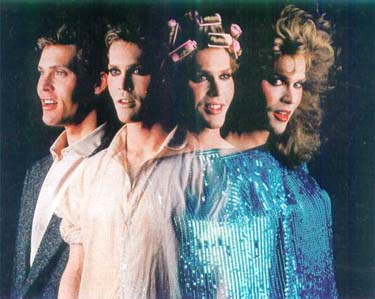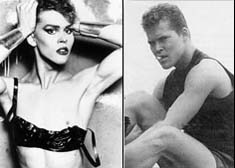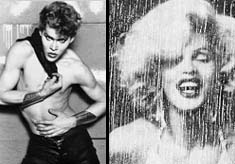 |


|
|
|
|
By Jack Nichols
In these few minutes I'd like to take you with me to a window. Come and look through this window. Even if you don't see what I see, I hope you'll go away with a clearer vision of what we who are men's liberationists are seeing. And if you do see what I'm seeing, I hope you'll go away and make plans to contribute to men's liberation in your own way.
 Logan Carter was a master/mistress of
the secrets of male and female posturing.
Logan Carter was a master/mistress of
the secrets of male and female posturing.
My first words are those I'd particularly hope you'll remember. Let me say them with a special emphasis: I am persuaded that being masculine in the conventional way is pushed by society on its sons with greater urgency and with wider effects than religious beliefs. Therefore, I am also persuaded that the vague masculinist codes as taught are reigning methods for transmitting prescribed social values. If the social system can no longer wholly count on religious beliefs to transmit values, it can still count on a handing down from parents and institutions of sex-role conditioning. This conditioning is more insidious, more limiting, more anxiety provoking than is any other kind I know about. In times past we've all heard authoritarians explain that political or religious training must be instilled in children before age 7. Those who train young boys-who condition their sex role-affect the minds of these children long before they reach the age of 7. Several recent studies show that boys know what is expected of them (what is suitably masculine) in kindergarten. Their training comes early. We know this now. And yet we have not yet examined how this training feeds the economic and political machinery of our social system. When we do start such an examination, we'll have a clearer view of the implications of masculinity training. It goes beyond personal and interpersonal effects to the very core of our military/industrial political combine. An example: When a man is unemployed, his role training has traditionally caused him to experience this as a personal failure as a man rather than as a disruption in the economic system. His masculinity is threatened, not his politics.
I should like to present a fact which can be acted upon by feminist activists and educators. Feminine influences are known by most young boys through their most formative years. Mothers, female teachers, grandmothers, they conspire to tell him that he must be all boy, becoming all man. They get backup from various institutions and from Dad, who delivers occasional pep talks about the macho pose. Usually dads have disappeared from the home scene, though, to fill their own male roles as providers/breadwinners. Therefore, they aren't around much to be male role models. Masculinist etiquette therefore is triggered by mothers in pre-school years, exemplified by distant fathers, praised by various institutions, including media, and enforced by peers.
While parents provoke anxieties over being a sissy, young males get together and pool their visions. What do they see? None may have a clear idea of what their much vaunted masculinity is supposed to mean to them except that they must be committed to it at all costs. Masculinity learned from peers is mostly the blind leading the blind. The young boys rely on parental taboos and prohibitions and vague anxieties associated with them and, as already said, they are machos in kindergarten. At the same time, they are learning to repress all of the feminine influences under which they have been reared. Women to such boys seem like recognizable subservients. If imitation is actually a sincere form of flattery, then most men do not admire women. If a boy has openly absorbed traits, virtues or capabilities associated with women he courts ridicule. So, whatever he feels within that he associates with women, he denies. He doesn't even question the wisdom of this denial. He and his peers end by drawing an exaggerated and oversimplified picture of what masculinity is about: an opposite of everything womanly. To hedge in the contradiction, negativity and anxiety this oversimplification creates, he clings to it tenaciously, reacting with hysterics to anything which challenges the authenticity of what he hopes is a convincing exterior. He adopts copied postures, mannerisms and responses to go with the role. The macho puff enters with tough and threatening stances, so-called rugged language, and controlled feelings. The oversimplified roles demanded by this culture are allowing role trainers to take human personalities and to cut them in half.
The transition from home conditioning to socialization that continues beyond the family goes on in schools where education and competitive sports assist the process. Boys are introduced to the world of "manly" affairs which prepares them to be decision-makers, competitors and achievers. Then, for some, there is military training to complete masculinist conditioning: The Army Will Make a Man Out of You. After this masculinist training, what are some of the ways men react? They make strike quickly, punching out. They avoid being expressive or showing affect. They emphasize power through posture and make appearances to suggest that they're tough, hard, unbending, dominant, eagerly competitive, controlling, on top. Men's Liberationists are now aware of the insidious aspects of the male role as it is known and taught. In modern industrial societies, it has been carried beyond the image of the blustering, stereotypical brawler. Where physical muscularism isn't any longer necessary to social survival, traditional masculinists have re-emerged on new levels, proving their masculinist identity through intellectual posturing and combat, technological dominance and control and narrowly empirical definitions of reality that reduce experience to measurements and statistics. In fact, I would go so far as to say that the flight by traditional males from virtues and capabilities associated with women: virtues and capabilities which rightfully belong to either sex, have made the male role as practiced lethal. It makes men who are poor at self-disclosure, who lack insight and empathy, and are incompetent lovers. It creates dispirited males. The time has come for men to recognize in themselves the existence of the androgynous being so that they can wield the strengths and spirited capabilities of both genders.
I should say a few words about the men's liberation movement and give my view of what it is about. It is newly evolving. It is without formal leadership, but has contributors who work cooperatively in non-hierarchal groups. This last month saw such groups celebrating at State College, Pennsylvania, a second national conference with participants (male and female) arriving from many states. The conference theme was Men Supporting Men. Some men have come into the men's movement through their feminist identifications. Most others have come for a variety of reasons: personal, ideological, therapeutic. I do not believe that it is good strategy for the men's movement to piggy back the women's movement. Men must sense their own interests at stake in this movement: both personal and social. But this doesn't mean that we in the men's movement would let the feminist analysis go unnoticed, or unappreciated. The men's movement-as part of a broader human development-has been developing strong commitments to equality between the two sexes. I'd like to emphasize that the men's movement speaks beyond sexual behavior as a singular focus of liberation. It points to ways in which sex-role programming in the male has led not only to sexual rigidity but to a monumental brutalization of life which males are conditioned to inflict and experience. The men's movement is showing how cultural demands for masculinist deportment are hangovers from a previous age, and that they are near the core-if not actually at the core-of the conditioned male's agonies, both personal and social. While the men's movement is set to help accomplish the realization of a peaceful, spirited culture, it is not an end in itself. It is part of an overall process toward human liberation, one major vehicle among others for the transformation of commonly held values which are no longer life-affirming. The conditioned male's personal agonies spread outward from himself to the social arena. Anyone who sees masculinist training as a prime source of social conditioning can understand that its exposure as a hotbed of negative values will bring about social change. At the same time, men who have been blocked by such values will supplant them and develop a new awareness, becoming sensitive to behavior that nurtures rather than imposes. Those who are shedding their old male roles and responses are creating perspectives better suited to survival. Therefore, they are not afraid to go straight to the center of the holy of holies, to tread without fear on sacrosanct territory, to inspect, question and doubt the concept of masculinity that currently reigns, showing that it is a crippling disease.
The man clinging to an orthodox sex role is using only half his potential and is, in fact, a half wit. His fear of being thought like a woman-a sissy-has led him to reject her virtues for himself. He thinks them unfitting. He does not realize that there are no masculine and there are no feminine virtues. Capabilities of mind like nurturance, for example, belong as well to both sexes. Cultural conditioning has robbed men of such capabilities: their birthright. This conditioning is damaging everything and everybody and great benefits will follow its passing. Men are in bondage. The "oppressor" is also the oppressed, carrying about with him a weight of chains he would unconsciously and clumsily fasten on others. Because the chains are invisible, he doesn't realize he's carrying them and the weight is falling on him too. He staggers, totters, and dies early. Death rates for males are nearly twice as high as they are for women across all age groups. Politically conscious people in the men's movement will keep its members aware of its political dimensions. Dr. Joseph H. Pleck, author and co-editor of Men and Masculinity (published by Prentice Hall) says: "It is becoming clear to me that we can only go so far in analyzing the male role and the problems we have as men in isolation from the larger society. We can study the male role forever, but its contradictions simply do not make sense until we start to examine the functions it serves in tying males to a society which does not meet their real needs and which is organized for quite different purposes." On the social level the masculinist role gives many men a false sense of power and privilege, reconciling them to subordination in society through psychological payoffs they receive as protectors, breadwinners and dominant figures in their homes: assuring them of their masculinity. In my book, Men's Liberation: A New Definition of Masculinity, published in 1975 by Penguin Books and also recently translated and published in West Germany, I made an examination of those fundamental masculinist values of which the men's movement implies criticism. I clarify new role options for men and speak of their benefits. I hope that my book will help move men beyond negative criticism of the male role, imbuing the movement with a positive spirit, the converse of concentration on mere drawbacks. Fundamental to my approach is my assurance that men are not innately violent, competitive or domineering, and that men have, in fact, tendencies to mutual aid and cooperation, tendencies which I believe have played a more significant role in social life than has been realized and which are being blocked today by sex-role conditioning and institutional interference. I am persuaded that the men's movement will enjoy invincible support as it grows. It is, for want of a better word, a kind of spiritual movement. It is a secular vehicle for values which have religious sanction: gentleness, tenderness, sensitivity, empathy, calm, non-violence. Its opponents must range themselves against these values as positive developments for men. Thank you for coming with me to this window and taking a look. If any one of you is interested in doing more than this, I'm alive so that I can help and cooperate with you. |

© 1997-2002 BEI
 Logan Carter: Tender versus Tough
in a legendary performer's face
Logan Carter: Tender versus Tough
in a legendary performer's face 
 Logan Carter: A fierce painted male becomes Marilyn
Logan Carter: A fierce painted male becomes Marilyn  GayToday editor Jack Nichols, pictured here at age 6, confronts gender issues in a kilt
GayToday editor Jack Nichols, pictured here at age 6, confronts gender issues in a kilt  Because he was able to project 'the boy next door' in his own many-faceted face, the late Logan Carter, a remarkable gender revolutionary, has been recalled to life in James T. Sears' new history of the GLBT South, Rebels, Rubyfruit and Rhinestones. This new book, published by Rutger's University Press, evokes the 1970s. It has been named 'a classic' by playwright Edward Albee and hailed by Rita Mae Brown who said: "Just name the place and we were there." Brown credits Dr. Sears with 'a sharp perspective' and calls Rebels Rubyfruit and Rhinestones 'a good read.'
Because he was able to project 'the boy next door' in his own many-faceted face, the late Logan Carter, a remarkable gender revolutionary, has been recalled to life in James T. Sears' new history of the GLBT South, Rebels, Rubyfruit and Rhinestones. This new book, published by Rutger's University Press, evokes the 1970s. It has been named 'a classic' by playwright Edward Albee and hailed by Rita Mae Brown who said: "Just name the place and we were there." Brown credits Dr. Sears with 'a sharp perspective' and calls Rebels Rubyfruit and Rhinestones 'a good read.'